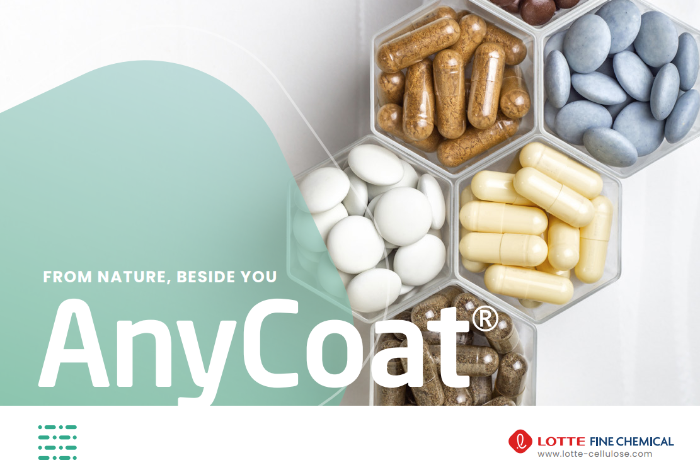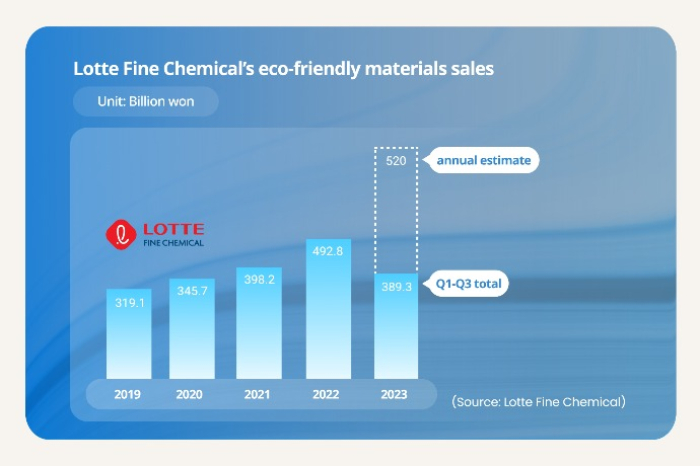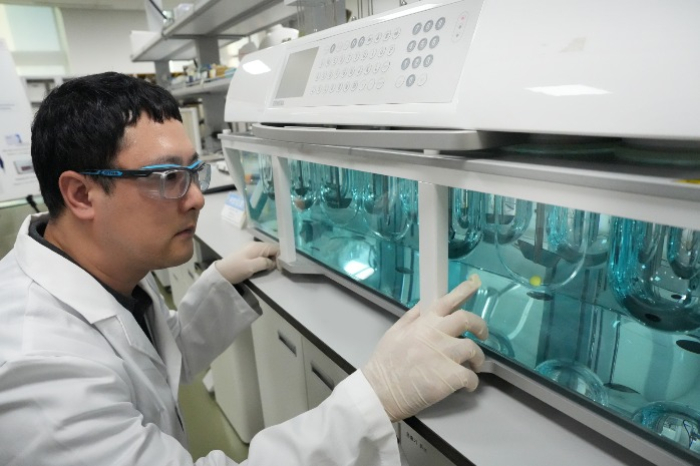Chemical Industry
Lotte Fine to invest $99 mn to up green materials sales by 6 times
The S.Korean chemical firm plans to ramp up food and pharmaceutical chemicals’ annual capacity to 6,000 tons
By Nov 24, 2023 (Gmt+09:00)
3
Min read
Most Read
LG Chem to sell water filter business to Glenwood PE for $692 million


KT&G eyes overseas M&A after rejecting activist fund's offer


Kyobo Life poised to buy Japan’s SBI Group-owned savings bank


StockX in merger talks with Naver’s online reseller Kream


Meritz backs half of ex-manager’s $210 mn hedge fund



Lotte Fine Chemical Co., South Korea’s largest ammonia producer, will spend a total of 129 billion won ($99 million) in an aim to become the world’s largest food and pharmaceutical materials producer and bump up its green materials sales by six times by 2030 to outdistance Chinese rivals.
The subsidiary of Lotte Chemical Corp. said on Thursday that its board of directors late last month approved a new plan to inject 79 billion won to jack up the production capacity of cellulose ethers widely used in manufacturing foods and pharmaceutical drugs to 6,000 tons a year.
The company originally planned to invest 39 billion won to expand the capacity to 3,000 tons.
Once the addition of new cellulose derivative production lines is completed by 2025 under the new plan, the Korean fine chemical company will boast the world’s largest production capacity of food and pharmaceutical chemical materials.
The US-based International Flavors & Fragrances Inc. (IFF) is currently the world’s No. 1 in the market, followed by Lotte Fine Chemical and Japan’s Shin-Etsu Chemical Co.

Lotte Fine Chemical has chosen specialty green chemical materials such as cellulose ethers as one of its key growth drivers as the sector bars latecomers from entering with high barriers.
Chinese petrochemical companies have rapidly caught up to Korean peers in production of basic chemicals with aggressive output ramp-ups in recent years, squeezing Korean players’ profitability.
However, they have not yet obtained the technology to produce specialty chemicals like green materials.
To further distance itself from Chinese rivals, Lotte Fine Chemical will also inject 50 billion won to build up its research and development capabilities in the green materials sector.
It plans to expand the number of its R&D researchers and scientists to 300 in 2030 from the current 62 to increase its green materials sales to 3 trillion won in 2030 from 492.8 billion won in 2022.
CELLULOSE ETHERS AS A KEY GROWTH DRIVER
Lotte Fine Chemical produces cellulose ethers that can be used in manufacturing foods and pharmaceutical drugs.

AnyAddy is its cellulose derivative used in food, food supplements and personal care to improve texture.
AnyCoat is its brand for cellulose ethers as an inactive drug ingredient used to enhance the sustained release of medicines. It is coated on tablets or capsules to slow the release of medical substances at a programmed rate to deliver the drug over a prolonged period to extend therapy efficacy.
Lotte Fine Chemical pins high hopes on cellulose ethers, demand for which is set to grow rapidly.
As the world's population is aging quickly and demand for capsule and tablet pills is rising fast, the inactive pharmaceutical ingredient market is forecast to grow to $12.2 billion in 2028 from $7.8 billion in 2022, according to Research and Markets.
In addition, biotech startups, which generally spend an astronomical amount of capital to develop novel drugs and several years of clinical trials to prove their efficacy and safety, rarely change inactive drug ingredients once they make a final decision, said Kang Gyung-don, the head of a research strategy team at Lotte Fine Chemical.
The Korean company is currently seeking to collaborate with a promising biotech startup to research and form a joint venture to develop such ingredients, while reviewing a merger and acquisition.
It also plans to work with biotech startups to advance into the generic medicine market with patent-expiring drugs, the company said.
Write to Hyung-Kyu Kim at khk@hankyung.com
Sookyung Seo edited this article.
More to Read
-
 PetrochemicalsLotte Chemical sells JV stakes in China, eyes other profitable markets
PetrochemicalsLotte Chemical sells JV stakes in China, eyes other profitable marketsOct 09, 2023 (Gmt+09:00)
3 Min read -
 Chemical IndustryLotte Chemical launches eco-friendly material brand Ecoseed
Chemical IndustryLotte Chemical launches eco-friendly material brand EcoseedSep 19, 2023 (Gmt+09:00)
1 Min read -
 Corporate restructuringLG to slim down petrochem as Chinese rivals creep up
Corporate restructuringLG to slim down petrochem as Chinese rivals creep upJun 19, 2023 (Gmt+09:00)
2 Min read -
 Carbon neutralityLotte Fine Chemical, OCI Global join hands for clean ammonia business
Carbon neutralityLotte Fine Chemical, OCI Global join hands for clean ammonia businessMar 15, 2023 (Gmt+09:00)
1 Min read -
 PetrochemicalsLotte Fine Chemical transforms from ugly duckling to golden swan
PetrochemicalsLotte Fine Chemical transforms from ugly duckling to golden swanFeb 13, 2023 (Gmt+09:00)
2 Min read
Comment 0
LOG IN


